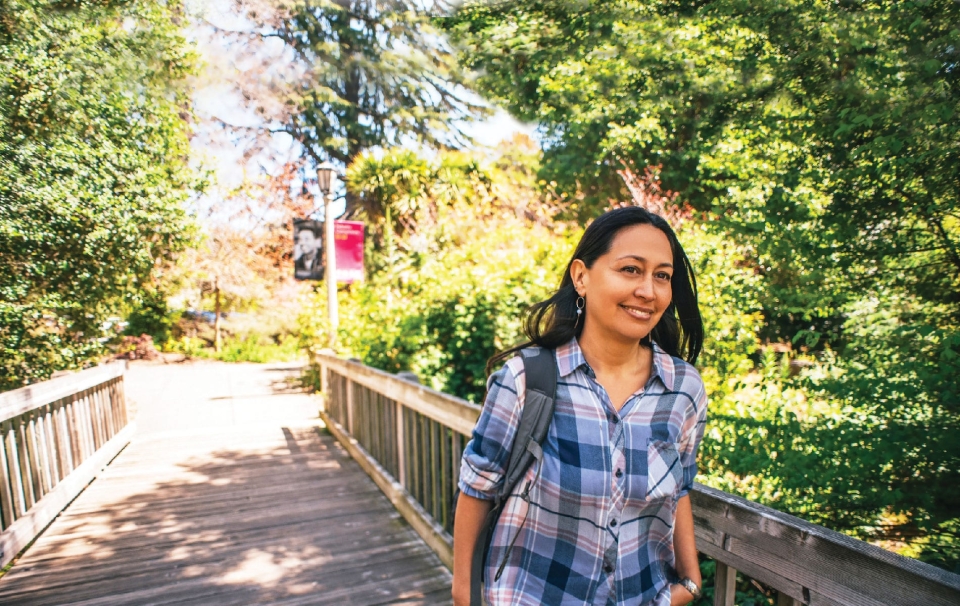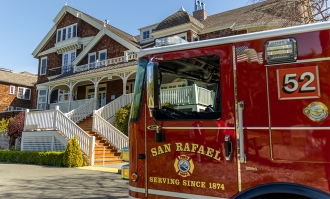- News
- News Archive
- Masters in Humanities
Masters in Humanities

“I think the Humanities and Cultural Studies program was a no brainer for me for my work, I so made a really conscious decision when I chose that program because I could see very clearly the path of the degree and how that supports my professional career.” - Sara Moncada (MA Humanities ‘18)
Sara Moncada was ready to hit the pause button on life. With only a high school degree under her belt, she had been working in the San Francisco technology industry since 2000. She started at the ground level and worked her way up the corporate ladder, but in 2014, she needed to take a break. Motivated by the desire to bring better balance to her life and find more personal meaning in her work, she quit her job. For her, the best pathway to accomplish this goal was to go back to school and complete her bachelor’s degree in humanities and cultural studies.
“The higher education learning process was well aligned with my need to pause and see what I’m really interested in - especially the humanistic studies where you see deeper explorations of meaningful connections in the world. It engages you in a way that you don’t find readily available in the average 9 to 5 life.”
Moncada lives in Marin County and has a young daughter. She wanted to be a student, but she also wanted to continue to work part-time. These factors made the Adult Degree Completion (ADC) Program at Dominican, with its day and night courses, an enticing option. And when she learned she could receive credits for her life experience, her decision to attend the program was clear. In the ADC course of study, students may write essays about their lives and earn units towards a degree.
“When you think about how cost prohibitive going back to school can be, being able to earn units writing essays made my undergraduate degree quite feasible and realistic.”
As a returning student with significant work and life experience under her belt, Moncada was thrilled that the program allowed her to bypass some general education requirements and explore studies that were thought provoking and outside of her knowledge base. All Dominican humanities students in the School of Liberal Arts and Education are encouraged to study the human condition through a rigorous interdisciplinary “deep dive” approach that includes history, English and artistic expression. It was an obvious choice for Moncada. She could clearly see how the interdisciplinary aspects of the degree program supported her budding professional vision - which was taking a sharp turn away from technology. And the personal relationships she was able to create with professors helped illuminate Moncada’s career path even more.
“There have been two professors in particular that have been extraordinarily supportive of my work and have also helped me get clear on voice and direction: Chase Clow, Ph.D. and Gay Lynch, Ph.D. I am deeply grateful for their mentorship and support, I wouldn’t be where I am today without it” she said. “But I often hear stories like that about Dominican professors - people are consistently inspired by professors."
• Request information about Dominican’s graduate program.
With the academic freedom and encouragement of her professors, Moncada realized she could incorporate other interests and values into her studies and, ultimately, her work. Moncada is a professional flamenco dancer and she runs a cultural arts company called Sewam American Indian Dance with her husband that reflects their Native heritage and culture. Her life and cultural experiences involve multiple perspectives. And, in stark contrast to traditional academic ideas which try to separate and distill ideas, her point of view is more holistic. But at Dominican, Moncada has the opportunity to marry the personal, professional and academic and, all the while, elevate the voice of Native people in the academy.
Her senior project, for example, was entitled “The We in Me: Exploring the Interconnection of Indigenous Dance Identity and Spirituality.” Moncada pointed out that scholarship in the realm of Indigenous and Native American music and dance was historically developed around very specific things - like one dance. That scholarship, many times, was funded by government war councils that watched the dances out of context and were, most likely, trying to acquire land owned by the tribes who performed them. Moncada believes these studies are still valid, but their sources should be thoughtfully considered.
“What happens when you really study something but only the arm instead of the whole being? What gets left behind? I wanted to open that up in conversation.”
Her fulfilling experiences as an undergraduate encouraged Moncada to apply for a Master’s degree in Humanities. She qualified for the Accelerated BA/MAH Program at Dominican, which allows undergraduate students who intend to obtain a Master’s degree to take up to twelve units of graduate Humanities seminars. Since these units may satisfy requirements and/ or electives for both degrees, the accelerated program may shorten the time needed to earn a Master’s degree.
True to Moncada’s philosophy, the academic conversations she continues to explore as a graduate student transcend classroom walls. Her studies have led to her current position at the Cultural Conservancy, a Native-run non-profit organization based in San Francisco that works to protect, revitalize and restore indigenous practices on traditional lands. They work on language revitalization projects, water restoration and agricultural projects, teach canoe carving and partner with tribes to train youth to record traditional creation mythologies.
“I think that exploring other culture’s relevance inside of the academic arena can really help support and amplify the non profit work as well - they’re natural partners.”
Moncada's graduate thesis explored indigenous relationships with seeds from the perspectives of history, culture, art, language, dance, and song. Her work with the Cultural Conservancy to connect Native youth and traditional Native elders and farmers at the College of Marin’s Indian Valley Farm and Garden influenced this project a great deal. Young people are introduced to traditional heirloom seed varieties that Native cultures have been relied upon for generations. Through this experience, Moncada explains, the Native community in the Bay Area, which faces a high risk of diabetes, can access healthy organic clean food and deepen their cultural relationships with food. Moncada asks, how are seeds relevant beyond just as a provider of food?
“What does it mean to have sovereignty over the decisions you make about food, especially for a community that doesn’t have access to that kind of conversation?”
When the relationships between seeds and cultural traditions are illuminated, she argues, you learn that their value is expressed through artistic expression. Songs and dances honor their beauty and teach lessons about how best to grow them. With her careful examination of culture through the lens of academia, Moncada is once again merging her personal, professional and academic worlds - a method that is supported and nurtured at Dominican.
“I have to walk a really balanced path to meet my needs from an academic research perspective but also from a cultural perspective...it’s important not to have an expectation of outcome, but to simply stop and listen.”



